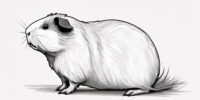What First Aid Supplies Should Every Guinea Pig Owner Have?
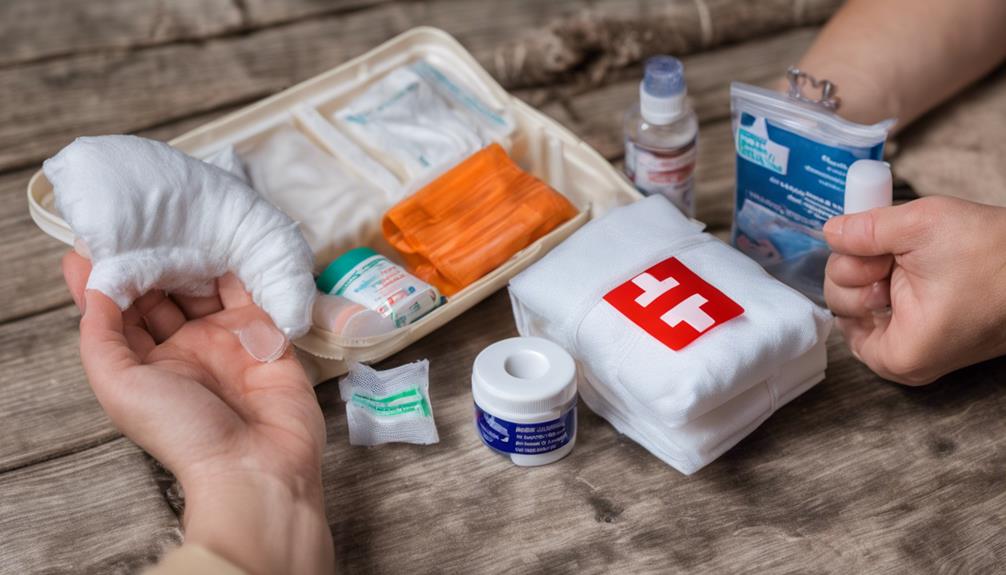
Guinea pigs are small and delicate animals that can easily get injured or sick. As a responsible pet owner, it is crucial to have a first aid kit specifically designed for guinea pigs. Some essential first aid supplies for guinea pig owners include:
- Gauze pads and bandages to dress wounds and stop bleeding.
- Styptic powder to help stop bleeding from minor cuts or nail trims.
- Saline solution to clean wounds or flush eyes.
- Antibacterial ointment to prevent infections in minor cuts or scrapes.
- Small scissors or nail clippers to trim overgrown nails.
- A pet-safe heating pad to keep your guinea pig warm in case of hypothermia.
- Emergency contact numbers for your veterinarian and an after-hours emergency clinic.
Having these supplies on hand can help you provide immediate care to your guinea pig in case of an emergency. Remember to always consult with a veterinarian if you are unsure about how to treat an injury or illness.
Key Takeaways
- Keep essential wound care items like gauze pads and antiseptic solutions.
- Stock up on medications for pain relief and infections, following vet guidance.
- Use proper grooming tools for nail trims and fur care regularly.
- Be prepared with emergency supplies, including vet contacts and feeding supplies.
Essential First Aid Supplies
In times of need, guinea pig owners should have essential first aid supplies readily available in their homes. Pain relief is a vital aspect of caring for these small pets. A safe pain relief option for guinea pigs is infant liquid ibuprofen, which can be administered in small doses under veterinary guidance.
Additionally, dietary supplements play a significant role in maintaining the health of guinea pigs. Vitamin C is essential for their well-being, as these little creatures are unable to produce it on their own. Providing them with vitamin C supplements or vitamin C-rich foods such as bell peppers can help prevent illnesses like scurvy. Always consult with a veterinarian before introducing any new supplements to make sure they're appropriate for your guinea pig's specific needs.
Wound Care Items
Guinea pig owners should make sure they've essential wound care items readily available to promptly address any injuries their pets may sustain. When it comes to wound healing, having items like sterile gauze pads, medical tape, and self-adhesive bandages is essential. These supplies can help protect and cover wounds, preventing further contamination or injury.
For proper wound cleaning, antiseptic solutions such as chlorhexidine or saline solution are important to prevent infections. Owners should gently clean the wound area with these solutions before applying any bandages. Ensuring the wound is free from dirt and debris is key to promoting effective healing. Remember to always consult a veterinarian if the wound appears deep, infected, or if there are any concerns about the healing process.
Proper bandage application is essential to protect the wound from further damage and promote healing. Owners should learn the correct techniques for applying bandages to avoid restricting blood flow or causing discomfort to the guinea pig. By having these wound care items on hand and knowing how to use them effectively, owners can provide the best care for their beloved pets.
Medications and Ointments
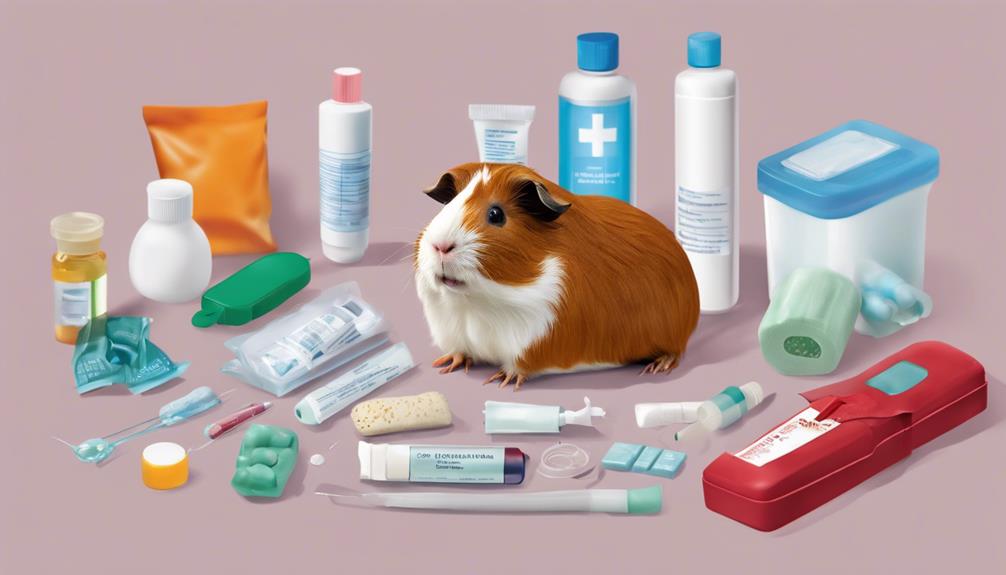
Among the essential supplies for guinea pig owners are medications and ointments that can aid in the treatment of various health issues their pets may encounter.
For pain relief options, consider having a guinea pig-safe pain reliever on hand. Always consult a veterinarian for the correct dosage and type of pain relief medication to administer.
Antibiotics are important for treating bacterial infections in guinea pigs. These should only be used under the guidance of a veterinarian to make sure proper dosage and treatment duration.
Skin treatments like ointments or creams can be beneficial for minor wounds or skin irritations. Having a basic understanding of how to apply these medications and ointments correctly is crucial to ensure your guinea pig receives the care that is needed.
Grooming and Cleaning Tools
Guinea pigs require regular grooming to maintain their health and well-being. Nail trimming tools and a hair removal brush are essential items for keeping your guinea pig clean and comfortable.
Nail Trimming Tools
Equipped with the right nail trimming tools, guinea pig owners can maintain their pet's hygiene and health effectively. Safe handling is important when trimming a guinea pig's nails to avoid causing injury.
Proper technique involves using guillotine-style clippers or small animal nail trimmers to carefully trim the tip of the nail, avoiding the quick. It's important to have styptic powder on hand in case of accidental bleeding.
Regular nail trims every 3-4 weeks help prevent overgrowth, which can lead to discomfort and potential health issues for the guinea pig. By investing in quality nail trimming tools and learning the correct procedures, guinea pig owners can make sure their pets' nails stay at a healthy length, promoting overall well-being.
Hair Removal Brush
To maintain a guinea pig's grooming and cleanliness, a high-quality hair removal brush is an essential tool for every conscientious owner. Regular grooming helps with fur care and reduces shedding, promoting a healthy coat and preventing mats. Here are three reasons why a hair removal brush is vital for your guinea pig's grooming routine:
- Shedding Control: A hair removal brush helps remove loose fur, reducing the amount of hair your guinea pig ingests during grooming, which can prevent digestive issues.
- Grooming Comfort: Regular brushing not only keeps your guinea pig's coat in good condition but also provides a bonding opportunity, promoting trust and reducing stress.
- Hygiene Maintenance: By removing dirt, debris, and loose fur, the brush supports proper hygiene, preventing skin irritations and infections.
Emergency Contact Information
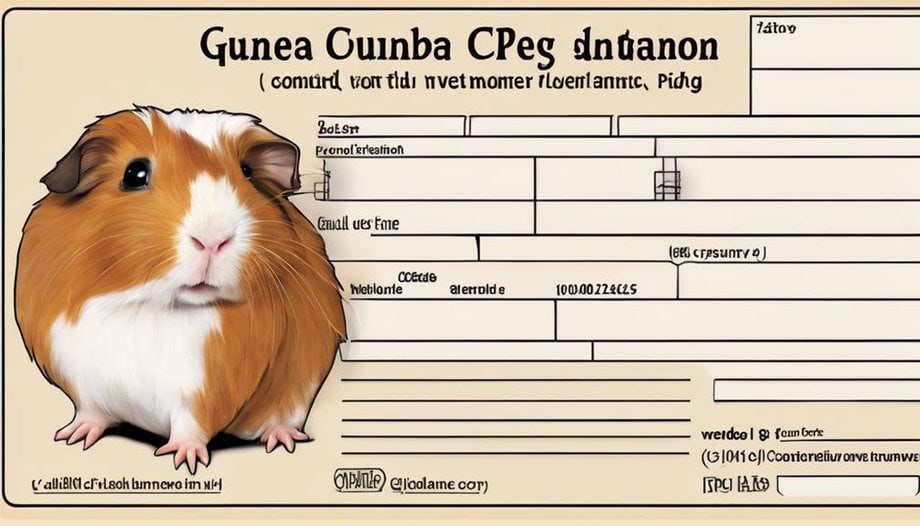
Ensuring that guinea pig owners have quick access to essential contacts is important in times of emergency.
Having the vet's contact details and an emergency helpline number readily available can make a significant difference in a crisis.
It's wise to keep these numbers in a visible and easily accessible place for quick reference.
Vet Contact Details
In case of emergencies, make sure you have readily accessible contact information for a trusted veterinarian who specializes in treating guinea pigs. It's important to have the contact details of an emergency vet, especially for after-hours situations when regular clinics may be closed. Here are three essential items to include in your vet contact details list:
- Emergency Vet After-Hours Contact Number: Make sure you have the number for an emergency vet who's available outside regular clinic hours.
- Regular Check-Up Schedule: Keep track of your guinea pig's regular check-up appointments to maintain their health and address any potential issues promptly.
- Specialized Vet Clinic Address: Note down the address of a specialized vet clinic that caters specifically to guinea pigs for any specialized care they may need.
Emergency Helpline Number
During urgent situations, having an easily accessible emergency helpline number can provide quick assistance for guinea pig owners in need. In times of distress, knowing who to call for emergency response and guidance assistance can make a significant difference in the well-being of your pet.
Make sure you have the emergency helpline number saved in your phone and posted in a visible spot in your home. This number should connect you with professionals who can offer quick actions and support tailored to guinea pig emergencies.
Stay calm, describe the situation clearly, and follow the instructions provided over the phone. Having this essential contact information readily available can help you navigate challenging situations with your beloved guinea pig.
Heating Pad or Heat Source
To keep your guinea pig warm and comfortable, a heating pad or heat source can be a valuable addition to your first aid supplies. Guinea pigs are sensitive to temperature changes, so having a reliable heat source can aid in maintaining their well-being. Here are some key points to contemplate when using a heating pad or heat source for your guinea pig:
- Temperature Regulation: Guarantee the heating pad is set to a safe and consistent temperature to prevent overheating or burns.
- Emergency Response: Be prepared to adjust the heat source quickly in case your guinea pig shows signs of discomfort or overheating.
- Bedding Options and Environmental Monitoring: Use appropriate bedding materials that facilitate heat distribution and regularly monitor the surrounding environment to assure it remains warm and dry.
Syringes and Feeding Supplies
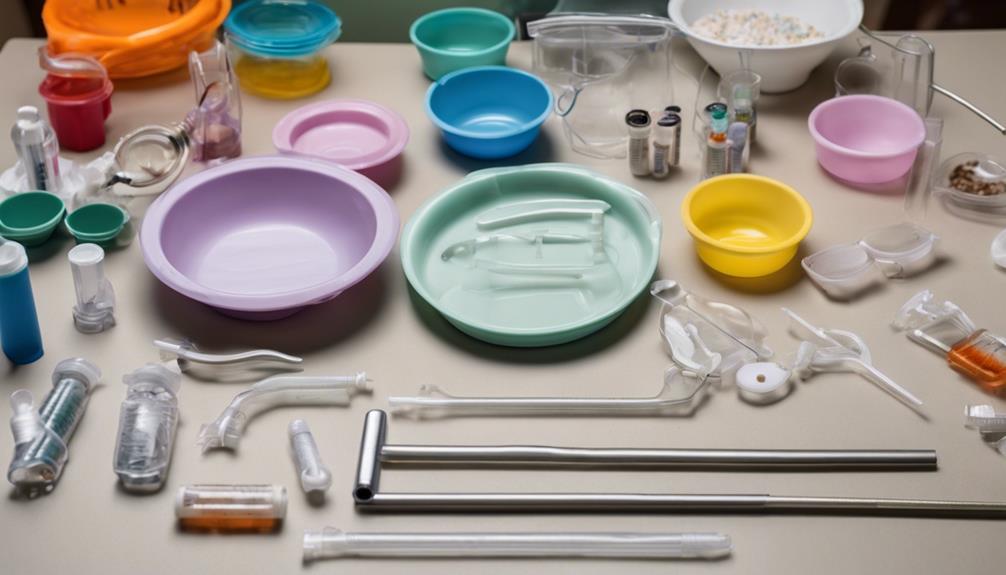
Maintaining a well-prepared first aid kit for your guinea pig includes having syringes and feeding supplies readily available for any potential care needs. When it comes to feeding tips and hand feeding techniques, guinea pigs may require extra care during illness or recovery periods. Using syringes to administer liquid medications or critical care formulas can be essential for their well-being. Hand feeding can provide important nutrients when a guinea pig is unable to eat independently. Make sure to consult with a veterinarian for proper liquid dosages and feeding instructions tailored to your guinea pig's specific condition.
Having the appropriate syringes in your first aid kit is essential for accurate medication administration and nutrient intake. Familiarize yourself with the hand feeding techniques recommended by professionals to guarantee the health and comfort of your guinea pig. Being prepared with these supplies and knowledge can make a significant difference in aiding your furry friend during times of need.
Pet Carrier or Transport Box
A sturdy and comfortable pet carrier or transport box is an essential item for safely transporting your guinea pig to veterinary appointments or in case of emergencies. When selecting a carrier, consider these points for the well-being of your furry friend:
- Travel Safety: Opt for a carrier that provides adequate ventilation and security to prevent escapes. Guinea pigs are small and fragile creatures, so a carrier with a secure latch is crucial to guarantee they remain safe during transit.
- Handling: Choose a carrier that's easy to clean and maintain. A carrier with smooth edges and a design that allows easy access will make handling your guinea pig stress-free for both you and your pet.
- Stress Management, Bonding: Introduce the carrier to your guinea pig gradually by placing treats or familiar bedding inside to create positive associations. This will help reduce stress during travel and strengthen the bond between you and your pet. Remember, a comfortable carrier makes for a happy guinea pig on the go.
Frequently Asked Questions
Can Guinea Pigs Be Given Over-The-Counter Pain Medications in Case of Emergency?
In emergency situations, guinea pigs should not be given over-the-counter pain medications without veterinary guidance. Proper pain management requires specific medication options tailored to their needs. Seek professional advice for the best care.
How Often Should Grooming Tools Be Cleaned and Sanitized to Prevent Cross-Contamination?
Regular grooming tools should be cleaned and sanitized after each use to prevent cross-contamination. Proper sanitization guarantees a healthy environment for guinea pigs. By maintaining cleanliness, owners can help prevent infections and keep their pets happy and well.
Are There Any Specific Feeding Supplies That Are Recommended for Guinea Pigs With Dietary Restrictions or Special Needs?
When caring for guinea pigs with special dietary needs, having the right feeding accessories and dietary supplements on hand is crucial. These items can help make certain that your beloved pets receive the proper nutrition they require.
How Should Guinea Pig Owners Prepare Their Pet Carriers or Transport Boxes for Emergencies?
In preparing carriers for emergencies, make sure they are clean, ventilated, and spacious. Include essentials like food, water, bedding, and emergency contacts. Safety measures such as securing doors and providing comfort are essential for guinea pig transportation.
What Should Guinea Pig Owners Do if They Are Unable to Reach Their Regular Emergency Contact in a Critical Situation?
In the midst of turmoil, when regular lifelines fade, guinea pig owners must grasp for backup plans. Rely on secondary emergency contacts, craft communication strategies, and investigate into crisis management to navigate the storm's uncertainty.

